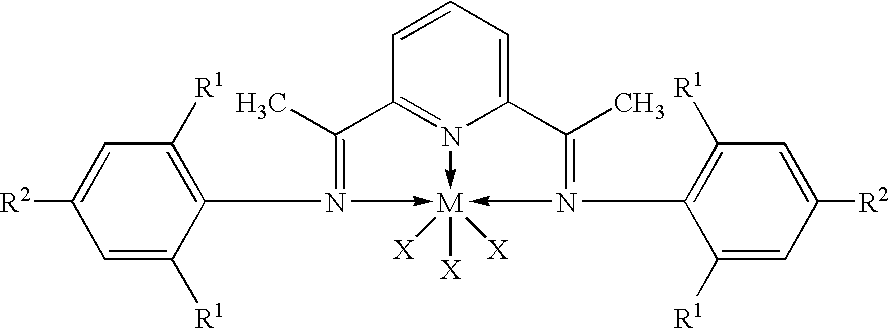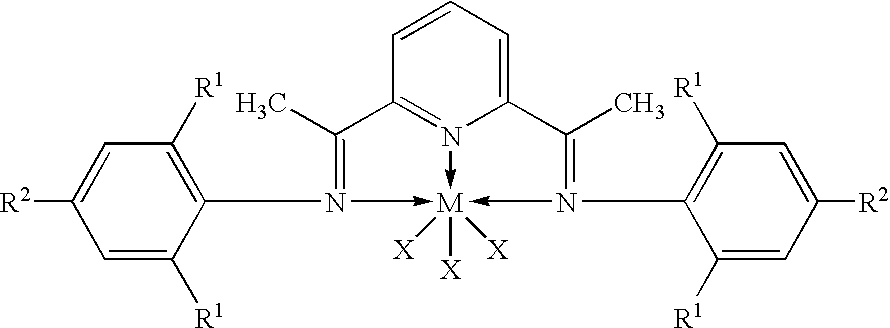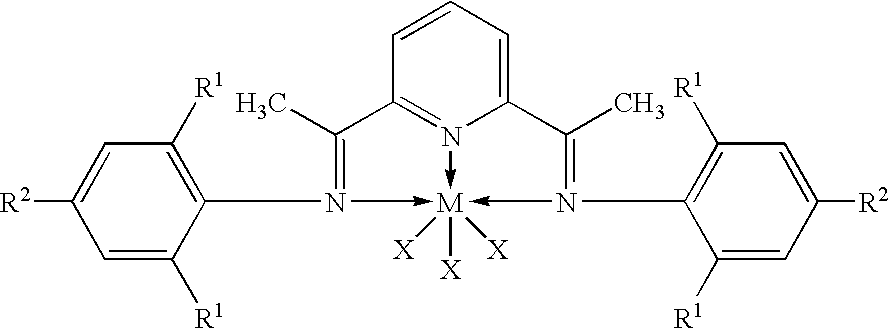Process for the manufacture of polyolefins using non-metallocene catalysts
a technology of non-metallocene catalysts and polyolefins, which is applied in the field of polyolefins manufacturing using non-metallocene catalysts, can solve the problems of several drawbacks of prior art processes known to the applicants for polymerization of ethylene using non-metallocene type complexes, and achieve the effect of reducing the ratio of co catalysts and any loss of productivity
- Summary
- Abstract
- Description
- Claims
- Application Information
AI Technical Summary
Benefits of technology
Problems solved by technology
Method used
Image
Examples
example 2
[0029] 3.1 mmol. of 2,6-diacetylpyridine was reacted with 9.5 mmol. of 2,6-dimethylanilone in n-butanol at a temperature between 110.degree.-118.degree. C. for 10-12 hours. The bisimine product thus formed was isolated and reacted further with 0.99 mmol. anhydrous FeCl.sub.3 in n-butanol for further 8-10 hours at the temperature between 110.degree.-118.degree. C. The corresponding bisimine complex of Fe(III) chloride was isolated, washed with ether and preserved in vacuum for two days and then stored in drybox.
example 3
[0030] 3.1 mmol. of 2,6-diacetylpyridine was reacted with 9.5 mmol. of 2,6-dimethylanilone in n-butanol at a temperature between 110.degree.-118.degree. C. for 10-12 hours. The bisimine product thus formed was isolated and reacted further with 0.99 mmol. anhydrous FeCl.sub.3 in 1,2-dichloro benzene for 8-10 hours at the temperature between 140.degree.-150.degree. C. The corresponding bisimine complex of Fe(III) chloride was isolated, washed with ether and preserved in vacuum for two days and then stored in drybox.
example 4
[0031] 3.1 mmol. of 2,6-diacetylpyridine was reacted with 9.5 mmol. of 2,6-dimethylanilone in n-butanol at a temperature between 110.degree.-118.degree. C. for 10-12 hours. The bisimine product thus formed was isolated and reacted further with 0.99 mmol. anhydrous FeCl.sub.3 in tetrahydrofuran at 65.degree.-67.degree. C. for 8-10 hours. The corresponding bisimine complex of Fe(III) chloride was isolated, washed and preserved in vacuum for two days and then stored in drybox.
PUM
| Property | Measurement | Unit |
|---|---|---|
| temperature | aaaaa | aaaaa |
| temperature | aaaaa | aaaaa |
| temperature | aaaaa | aaaaa |
Abstract
Description
Claims
Application Information
 Login to View More
Login to View More - R&D
- Intellectual Property
- Life Sciences
- Materials
- Tech Scout
- Unparalleled Data Quality
- Higher Quality Content
- 60% Fewer Hallucinations
Browse by: Latest US Patents, China's latest patents, Technical Efficacy Thesaurus, Application Domain, Technology Topic, Popular Technical Reports.
© 2025 PatSnap. All rights reserved.Legal|Privacy policy|Modern Slavery Act Transparency Statement|Sitemap|About US| Contact US: help@patsnap.com



